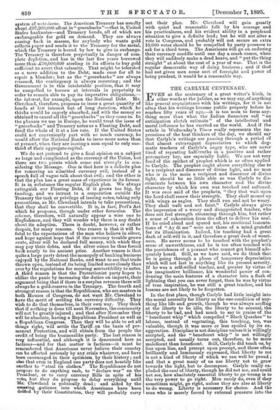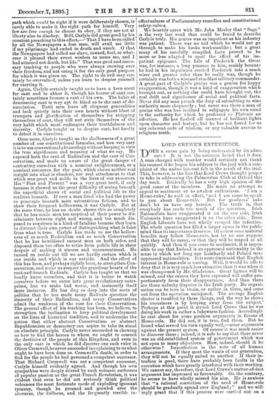THE CARLYLE CENTENARY. E VEN at the centenary of a great
writer's birth, in other words at the jubilee, as we may say, of anything like general acquaintance with his writings, for it is not often that his writings become public property before he reaches fifty years of age,—it is too soon to form any- thing more than what the Indian financiers call "an anticipation sketch estimate" of the intellectual and moral influence he has exerted on the world. And if the article in Wednesday's Times really represents the im- pressions of the best thinkers of the day, we should say that Carlyle's writings are passing through a period of that almost extravagant depreciation to which dog- matic teachers of Carlyle's angry type, who are never tired of repeating half-truths in a positive and rather peremptory key, are especially liable. We are not very fond of the epithet of prophet which is so often applied to Carlyle. The prophet ought above everything else to be a recipient and discerner of divine light, and no man who is in the main a recipient and discerner of divine light, should be so little able as was Carlyle to dis- criminate between his own character and the divine character by which his own was touched and softened. It was once said of the prophets, "they that wait upon the Lord shall renew their strength. They shall mount up with wings as eagles. They shall run and not be weary. They shall walk and not faint." Carlyle always gives the impression of a weary and disappointed teacher, who does not feel strength streaming through him, but rather a sense of exhaustion from the effort to deliver his soul. If he cried aloud and spared not, his continual lamenta.- tions of " Ay di me " were not those of a mind grateful for its illumination. Indeed, his teaching had a great dash of self-will in it, and therefore a great dash of weari- ness. He never seems to be touched with the prophet's sense of unworthiness, and he is too often touched with the peevishness of a peasant who cannot get himself ade- quately heard. Still, as we have said, we do think that he is going through a phase of temporary depreciation which will not last in anything like its present severity. If he was a sell-willed teacher, and greater by virtue of his imaginative brilliance, his wonderful power of con- densing the main features of a character into a flash of lightning that you can never forget, than he was by virtue of true inspiration he was still a great teacher, and his lessons are not likely to be forgotten.
In the first place, though Carlyle had little insight into the moral necessity for liberty as the one condition of any- thing like life and growth, though he was always scoffing at the liberty to be idle, the liberty to be sensual, the liberty to be bad, and had much to say in praise of the "beneficent whip" which compelled "Black Quashee " to labour, instead of vegetating, this teaching, too, was valuable, though it was more or less spoiled by its ex7 aggeration. Discipline is not discipline unless it is willingly accepted, and the "beneficent whip" is not willingly accepted, and usually turns out, therefore, to be more maleficent than beneficent. Still, Carlyle did teach us, by line upon line, and precept upon precept, and those often brilliantly and luminously expressed, that liberty to rot is not a kind of liberty of which we can well be proud ; and that a great many of us use liberty not to grow towards the light, but to decompose. Carlyle really ex- ploded the cant of liberty, though he did not see, and could not see, how absolutely essential liberty to go wrong is to the very power to go right. Men rarely do even if they sometimes might, go right, unless they are also at liberty to do wrong. Liberty is necessary for choice. And the man who is merely forced by external pressure into the path which would be right if it were deliberately chosen, is rarely able to make it the right path for himself. Very few are free enough to choose to obey, if they are not at liberty also to disobey. Still, Carlyle did great good by his, constant preaching to this effect,—" That I have been called' by all the Newspapers a free man, will avail me little if my pilgrimage had ended in death and wreck. 0 that the Newspapers had called me slave, coward, fool, or what- ever it 'pleased their sweet wisdom to name me, and I had attained not death, but life." That was good and neces- sary teaching to people who were always crowing over their freedom, and net using it for the only good purpose for which it was given us. The right to do evil may cer- tainly be overvalued, unless you learn to despise yourself for exerting it.
Again, Carlyle certainly taught us to have a keen scent for cant and to abhor it, though his horror of cant cer- tainly sometimes became a cant of his own. The habit of denouncing cant is very apt to blind us to the cant of de- nunciation. Until men leave off eloquent generalities and look quietly into their own hearts without blast of trumpets and glorification of themselves for stripping themselves of cant, they will not strip themselves of the very habit which most endangers their truthfulness and sincerity. Carlyle taught us to despise cant, but hardly to detect it in ourselves.
Once more, Carlyle taught us the shellowness of a great number of our constitutional formulas, and how very easy it is to use conventional phraseology without keeping in view the true significance and meaniug of what we say. He exposed both the cant of Radicalism and the cant of Con- servatism, and made us aware of the great danger of contenting ourselves with a nominal enlightenment, or a nominal reverence for the past, which shows neither real insight into what is obsolete, nor real attachment to that which was great and noble in the lives of our ancestors. His "Past and Present" was a very great book, if only because it showed us the great difficulty of seeing beneath the superficial shows of social and political life to the realities beneath. If ever a man lived who had the power to penetrate beneath mere ostentatious fictions, and to show their frequent hollowness, it was Carlyle. But at the same time, he has no doubt shown this so completely that he has made men too sceptical of their power to dis- criminate between right and wrong, and too much dis- posed to acquiesce in a kind of fatalism because they learn to distrust their own power of distinguishing what is false from what is true. Carlyle has made us see the hollow- ness of so much Radicalism and so much Conservatism that he has bewildered earnest men on both sides, and disposed them too often to retire from public life in sheer despair of making it sincere and unconventional. He turned us inside out till we are hardly certain which is our inside and which is our outside. And the effect of this has been, and perhaps rightly been, to strengthen Con- servatism, and make us suspect the grandiose boasts of the root-and-branch Radicals. Carlyle has taught us that we hardly know ourselves, and that it is better to watch ourselves before we enter into great revolutionary enter- prises, lest ve make bad worse, and insincerity itself more insincere. He has dug so deep into the roots of politics that he has made many Radicals question the sincerity of their Radicalism, and many Conservatives admit the weakness of the case for their Conservatism. The general effect of his teaching has been, we believe, to strengthen the inclination to keep political development on the lines of historical tradition, and to undermine the notion that either abstract Conservatism or abstract Republicanism or democracy can aspire to take its stand on absolute principle. Carlyle never succeeded in showing us how to find the heroes to whom we ought to commit the destinies of the people of this Kingdom, and even in the only case in which he did discover one such ruler in Oliver Cromwell, he never succeeded in explaining to us what ought to have been done on Cromwell's death, in order to find for the people he bad governed a competent successor. That Richard Cromwell was not a competent successor, Carlyle himself evidently agreed. And though his own sympathies were deeply stirred by such volcanic outbursts of popular passion as the great French Revolution, it was evident that even he did not seriously think political volcanoes the most fortunate mode of exploding ignorant tyranny, though he groaned and growled over the slowness, the dullness, and the frequently terrible in- effectualness of Parliamentary remedies and constitutional safety-valves.
. We heartily agree with Mr. John Morley that "Sage" is the very last word that could be found to describe Carlyle truly. His genius was as impatient as his industry was patient. There was no toil which he would not go through to make his books workmanlike ; but a great many of his carefully compiled facts proved to be more or less adapted to spoil the effect of his im- patient epigrams. The Life of Frederick the Great was, for instance, a long penance to him, mainly because he had in his impatience erected Frederick into a much wiser and greater ruler than he really was, though he certainly was both a wise and steadfast military commander. A great part of Cailyle's genius was a genius for happy exaggeration, though it was a kind of exaggeration which brought out, as nothing else could have brought out, the real drift and significance of social and political facts. Never did any man preach the duty of submitting to wise authority more eloquently ; but never was there a man of genius who was less inclined to subjugate his own mind to the authority for which. he .professed so Platonic an affection. He has flashed all manner of brilliant lights upon character and history, but he has not found for us any coherent code of wisdom, or any valuable avenue to religieus truth.























































 Previous page
Previous page